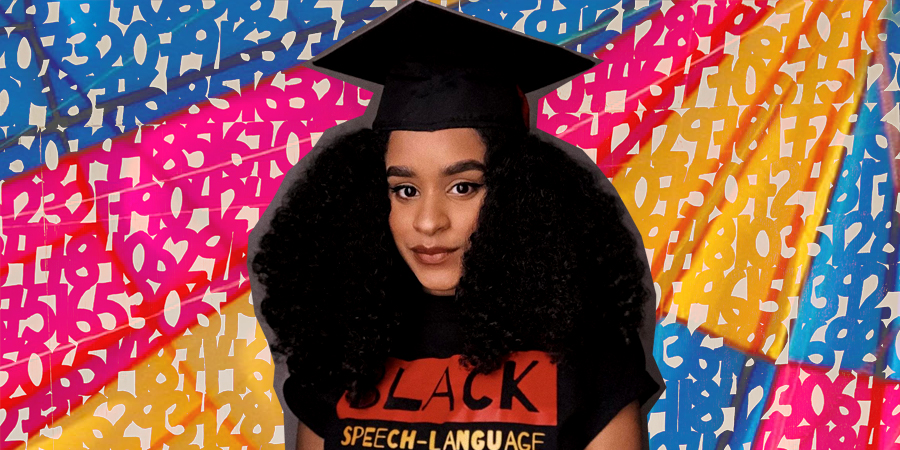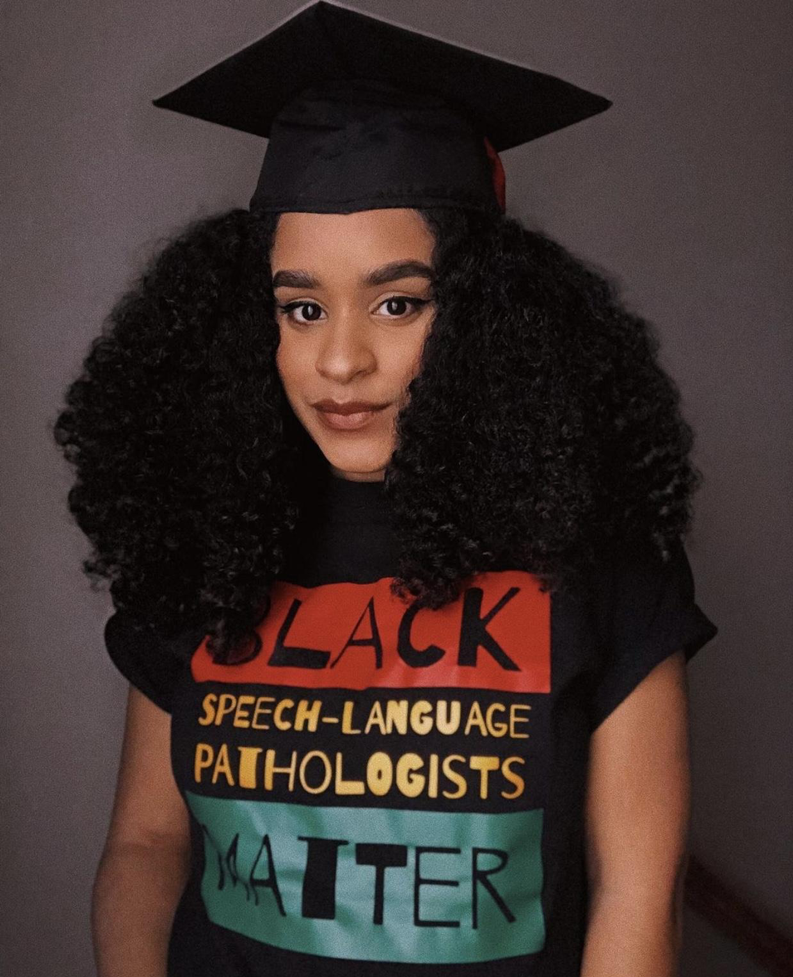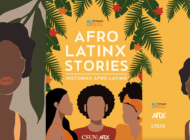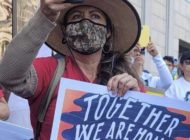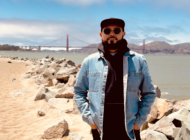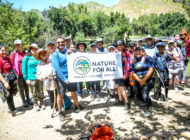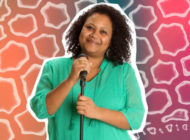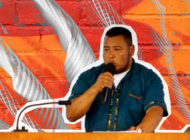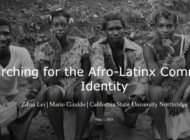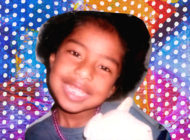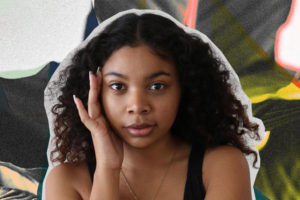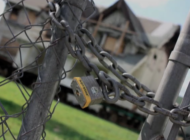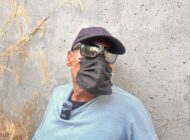In this episode, Cynthia González talks to Amanda Pericles about her life and how she advocates for Afro-Latinidad on social media.
By CYNTHIA GONZÁLEZ
EL NUEVO SOL
Cynthia Gonzalez: Welcome to Radio Nepantla, a podcast by El Nuevo Sol, the multimedia site for the Spanish-language journalism program at California State University at Northridge. My name is Cynthia Gonzalez.
The title of this series is Afro-Latinx. We want to tell here diverse stories of Afro-Latinx, Black-Latinx, and Afro-Latin American identity.
According to the Pew Hispanic Center, one out of every four Latinos in the nation identify as Afro-Latinx. This is the same proportion of Afro-Latin Americans in that region.
We decided to use the term Afro-Latinx—with X—to be inclusive of non-binary people. The umbrella term “Black-Latinx” refers to biracial people with one African-American and one Latinx parent. The umbrella term “Afro-Latin American” refers to people of African ancestry in Latin America.
In this episode, I interviewed Amanda Pericles about her life and how she advocates for Afro-Latinidad on social media.
Amanda Pericles: My name is Amanda Pericles. I am she/her pronouns and I am currently 28 years old, living in Rhode Island, Massachusetts. And I identify as a Dominican-American.
Cynthia Gonzalez: Amanda was raised in a Latino household, with many others that looked like her, and she identifies as Hispanic.
Amanda Pericles: I think especially for my home life, we went to church a lot and stuff and it’s a Spanish-speaking church. So like all of us identify as Hispanic—like first and foremost. I think my identity was mostly rooted in that. So that may have contributed to other people seeing me as Dominican or Hispanic before being like Black. It is hard to answer but I would assume probably the former, just because that is how I identified, as well.
Cynthia Gonzalez: Growing up, Amanda recalls experiencing some microaggressions but not overt racism.
Amanda Pericles: In terms of like outright discrimination… It was something that I didn’t necessarily like either—I didn’t notice, or I didn’t really experience it much because of where I am I think, in the East Coast. Up north so as opposed to like some of the more blatant discrimination and racism that you might find in other places up hear sometimes it is more passive or it’s in the form of microagression. Obviously for some people they do experience that but, that I can recall, it was more like comments about my hair or like my curly hair or things like that. Or like… being articulate or things like that. And then as an adult, I think like, for example, the first time I heard someone use the N-word directed towards my group of friends. Was like when was that maybe like three years ago out and about. I feel like it was mostly in the form of microaggression. Or like things that I wasn’t really noticing. Like now as an adult who identifies in a certain way that is completely different from the identification that I used when I was younger. I’m on the lookout for those things so maybe they were present and I just didn’t notice them. But yeah I feel like it’s different especially since I am up north. And because of the way I identified. And also because of my privilege. I’m lighter skinned and I have looser curls. So in terms of being around my family and stuff it was like I got the morena comments, but it wasn’t terrible in terms of like you’re ugly because of this, or like don’t go out in this one, kind of a thing. It wasn’t that.
Cynthia Gonzalez: Amanda explains her journey with her hair from her childhood, when she experienced conflicting messages about how to do her hair.
Amanda Pericles: I have curly hair and then growing up I was around, a different, you know, a bunch of different kids. Whether they were Black, White, whatever. But in like the majority of my life which was like church and stuff and being home my life was kind of split between Guatemalans and Dominicans. And so I had like really strong macho thick hair, as they would say. And I wore my hair curly. As a kid my mom would always have it in braids. It took two people to even do it at the salon. I started getting it relaxed when I was ten. So that was a shift in my thing and then some new friends came to church and their hair was like that looser kind of thin curly hair, as opposed to like my thick poof. So I think like growing up as a teenager for sure was when I became aware of the differences even within the curly hair. Like I wanted the looser curls that I can just put some gel in it. And it would be chill as opposed to my hair which like is a big thing that I had to take care of. So but at the same time we had other friends who were Black but like from non-Spanish speaking countries and because of the way that I was raised and stuff and all the anti-Blackness and all those things that I had internalized. I thought that I was better because I had better hair and stuff like that. So I was stuck in the middle of like wanting that type of curly hair but also like feeling like I was better than other people because or like prettier because I had this hair that I could straighten whenever I wanted to. It was beautiful and it wasn’t like weird when I blow dried it. It didn’t look like I had just blow dried it. I could get it pin straight compared to other people. You know and I could flip between the two, well not really because I straighten my hair all the time. So yeah so again I was straightening my hair all the time.
Cynthia Gonzalez: It was not until college that Amanda established a better relationship with her crown and her own Black identity.
Amanda Perciles: I stopped relaxing it eventually. And when I got to college was when I started to wear it out—like curly and not straightening it as much. I think that is kind of what jump started or was the catalyst for my like racial identification like changes as an adult. So I started wearing my hair naturally and then just being in college, and being in a different environment. You know, like I was hanging out with a certain type of people. And I was like asking myself these questions about like who I was and where I felt at home—where I felt accepted and where I didn’t feel accepted. Or differences that I felt with different demographics. And I just kind of realized that I was Black and it wasn’t like I was a special Black because I was Dominican like I was just Black, you know. So I think the hair bit in particular was like kind of one of the big things that I always say was the catalyst for my identity and kind of changing my redirect around how I identify. So after that in college you know I was wearing my hair curly all the time. And now as an adult who is 28 is like a big part of identity. I just chopped it off the other day. Or like a couple months ago for like the first time in forever. It’s the shortest it has ever been. It is very strange, I tell people that it was like my crown that like I had to learn to love. You know so like after years of telling yourself that it is something that you should love and that it is beautiful and that it is your crown. You start to kind of get attacked to it and it becomes a symbol of your beauty right that you had to work so hard to like associate with beauty—and be you.
Cynthia Gonzalez: And now, Amanda is learning how not to let her hair define her femininity, her beauty, or her Blackness.
Amanda Pericles: I had big hair that everyone knew about. I had long big hair that, you know, would sit on top of my head. So then it was like kind of switching it now, right, or like my hair isn’t just me—it’s not my beauty. It’s not what determines whether I am beautiful or not. So I had to like take that jump in to like switch that mindset. You know, hair does not equal femininity. Especially in like our culture where long hair is what is beautiful, right? So that is kinda been the journey. I have had lots of like ebbs and flows with the hair but now it’s like, “hair is hair.” Yeah, it’s beautiful. And especially as a Black woman it is something that defines us and that we take really great pride in—in loving and in learning how to love it. But it is also, like, it doesn’t define who I am and it doesn’t define what makes me feminine or a woman or beautiful. So that is kind of where I am now.
Cynthia Gonzalez: For Amanda, college became a transformative place that helped her define and continue redefining her identity.
Amanda Pericles: I always say that once you open your eyes to problematic things about yourself or like about the world in general, once your eyes are open to that like they are open to so many other things. Like in college, I had to unlearn colorism or like probably even after college—still thinking certain things. So like in college and after college I had to unlearn colorism. Like anti-Black things that you know we grow up as Hispanics thinking or Dominicans in particular thinking. And as that goes unlearning misogyny and patriarchal things. And then as you keep going it is like homophobic and transphobic especially someone who grew up in a church who thought all these things, these terrible homophobic or transphobic—all these things. And then after that it’s like learning how to not be ableist. And it’s like all these things you just keep going. Once you learn one thing it’s like hard to not see the oppression. And like the problematic things and thinking that you have, well at least for me it was. So it’s like something that continues the evolving learning process. From college to now I am a completely different person like if you go back to I started college in 2010 like me now compared to then. All those things that I just mentioned were deeply ingrained in my thinking. Like slut shaming and like sexual like freedom and like all these things like all those things were part of who I was and what I was taught and what I was thinking at the time. After college it just like went out the window—so, one by one, but slowly.
Cynthia Gonzalez: No soy ni de aquí ni de allá is a phrase that is very meaningful to many. In Amanda’s case, as a first generation American, she feels she belongs to this country.
Amanda Pericles: I feel like my stance or like my experience with that phrase ni de aqui, ni de allá is a little bit different, especially since I feel like I am more Americanized than most people and not tied to Dominican culture. But it still kind of does apply in the stereotypical sense, especially now that Afro-Latinidad is popular. Where, you know, you see women like me. Especially ones that have a little bit more pretty privilege, quote on quote, or like the hair—lighter skin or whatever. Not feeling accepted by—too Latina for the Blacks, and too Black for the Latinas—so it’s like in that sense. That is kind of what I felt or what I felt growing up. So in terms of ni de aqui, ni de alla as a Dominican-American born here, I probably would feel, too, de aca. If I went to D.R., even among my friends that I grew up with, like their parents either don’t speak that much English, or like you know they speak majority Spanish at home. More like they grew up even though we were a very strict conservative like upbringing like, now they still listen to all the music. Or like they talk slang and like I’m like I don’t even know what that means. Like if you ask me what that was I wouldn’t even know so like yeah I feel like there definitely is something where I feel like I am a little bit more American than others. I feel it sometimes I’m like I wish I were in tune with it you know. So, yeah I definitely do feel it sometimes.
Cynthia Gonzalez: Many people have privilege and are not aware of it but Amanda is. But her privilege was not her inspiration to start advocating for Afro-Latinidad and finding a community to learn from and to share experiences with.
Amanda Pericles: So again there I go not knowing and not understanding the privileges that I have. So it was something that had to come to learn and like actively think about like, “oh, am I taking up space for people who have been doing this work for like years,” right, who don’t get put on a pedestal—who aren’t called for the interviews or who aren’t put on the podcast or put on the magazines, you know? So it wasn’t something that I thought about. It was more of a like a personal thing for me, that I wanted to kind of just discover and explore just like publicly, you know? That kind of turned into like me learning from these people that I just talked about who have been doing the work, right? And then because you know I might be more palatable or things like that, then I get called or I get chosen for certain things and then even then it still took me years to realize… I had that privilege. That sometimes I had to take a step back, you know? So it definitely wasn’t something that I even consciously was thinking about. Like o.m.g. I have this privilege let me use it for good. I was just like being selfish and was like, “hey, I want to think about these things publicly for myself.” And then it kind of turned into an avenue to just share with others. And like educate others as well. So now definitely I do take that into account. Like I do have privilege, like, I have a platform so I try to disseminate as much information as possible and be as much of an advocate for people as I can, for as many people as I can, as much as I can.
Cynthia Gonzalez: Amanda is a hard working mother to a little girl. Her daughter is also part of Afro-Latinas. She explains how she is going to raise her daughter the best way that she can and instill teachings that were not offered to her and teach her about her roots and privileges.
Amanda Pericles: I was raised in New England. I didn’t really go out much you know I was raised by parents who valued respectability politics. And my partner was also raised in the same denomination church but in the South. But also caribbean parents who deeply valued respectability politics and speaking proper and going to school, because that makes you better than other people or that puts you in a better position. So it is gonna be like a fine balance of like giving her all the opportunities to get forward in life while teaching her that you know it doesn’t make you better than another person. And also understanding the privileges she has right. So like you have this privilege of like potentially going to school or like going to a private school for college of for even high school maybe. Or you have two parents at home or we have this income or you know even know, I don’t know what she is going to look like when she grows up. But she is you know she’s a pretty baby she didn’t come out with my hair. She has straight hair right now that is like starting to curl so I’m like I don’t even know what you’re gonna look like. You know so I think that it is going to be hard. I feel like every parent probably is like what do I even do. Kind of like what I am thinking all the time like how do I do these things. And I think that we just start with responsive parenting and like careful and gentle parenting so like starting with her emotional needs first and knowing that she can always come to me for her emotional needs. And then you know just telling her how the world works in whatever way you tell children you know. So that is like a really hard question to answer but definitely I think about it all the time. And even now we are moving you know to down south and you know are we gonna be there the whole time. Is she going to go to school there. I just read an article literally about in that same state a boy got put go like arrested or whatever for picking a flower from somebody’s yard. And I was like omg you know thinking about those things. Where you are is definitely hard to kind of navigate but yeah. It is a really hard question to answer.
Cynthia Gonzalez: Amanda reflects about her experience and how everything boils down to one thing…
Amanda Pericles: I would always just say to live everyday just trying to be a better person. And like doing introspective work. Whether you’re a non-Black Mexican, whether you’re a Black Mexican. Whether you’re a Black person that is not Hispanic you know it is always about just like living each day trying to be a better person for me. And doing that introspective and thinking about why you think certain things. Where you learn them from and whether they’re harmful to other people. And how you can just be a better advocate for others. And like a better place that is welcoming to others. You know as a person you know so yeah read books, google is free. Do your research and listen to people. Yeah just try to be a better person everyday. That is my main advice.
Cynthia González: Thanks for listening to Radio Nepantla—La Voz que Traspasa Fronteras. We invite you to listen to the rest of the series Afrolatinx … We will tell you stories of Afro-Latinx identity.
Listen to our podcast on your favorite platform. You can also check our SoundCloud channel—ElNuevoSol—or our website: ElNuevoSol dot net.
This was a production of El Nuevo Sol—the multimedia project of the Spanish-Language Journalism program at Cal State University, Northridge.
This episode was produced and edited by: Cynthia Gonzalez.
Voice (or voices): Amanda Pericles and Cynthia Gonzalez.
Music by [the Afro-Colombian group Kombilesa Mi].
See you next time.
Tags: #AFLX Afro-Latinx Amanda Pericles Cynthia Gonzalez Dominican American Dominican Republic podcast Radio Nepantla






